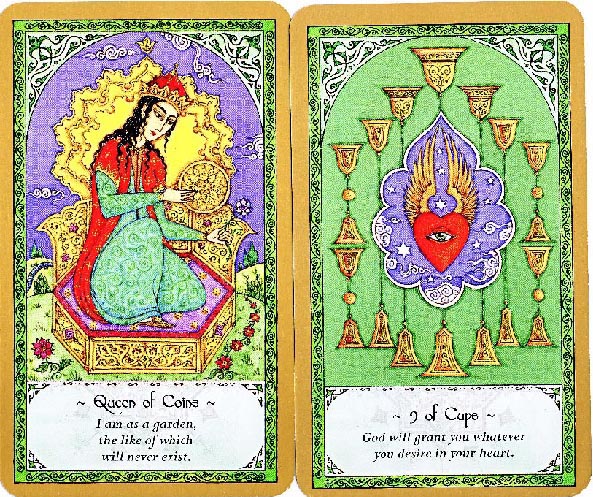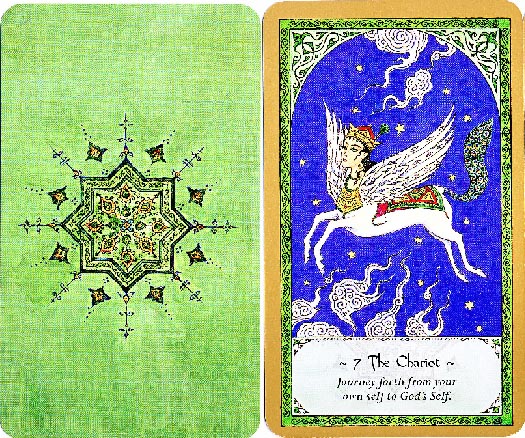
This deck-book boxed set features the work of the mystical Nigel Jackson. Jackson has sifted through the writings of 13th century mystic Sufi poet Jalal al-Din Rumi and blended them with his own exotic artistry in the Rumi Tarot. The deck is purposely focused on the idea of reconnecting the soul with the “center of authentic being through the remembrance of God and union with his divine truth.” The concept of transcending the material world is central to the esoteric ideology of Sufism, a Gnostic branch of Islam. Whirling dervishes who twirl to the driving beat of wild drums to reach ecstatic states of awareness are the familiar representatives of this strange mystery cult.
The 78-card deck is loosely based on the RWS model, and each card features a well-chosen caption from Rumi’s poetry. The captions are included to echo the tradition of using the writings of Rumi in bibliomancy (opening a book at random for oracular wisdom). Jackson deftly captures the elaborate delicacy of medieval Persian art. The trump cards feature full-sized renderings, while the pip cards feature framed cartouches with miniature card-related images. The court cards are extraordinarily lovely, and feature full-sized figure drawings.
The 294-page book, “Guide to the Rumi Tarot,” is an excellent complement to the deck. Jackson provides a thorough introduction to Sufism, in which Rumi is considered to be a saint. Like many illuminated masters, Rumi’s teachings focus not only on reaching towards union with God, but also on compassion toward all creatures, tolerance of others, and living with love for all things. For Rumi, a relationship with God was a passionate love affair fired by mystical longing. Another chapter traces the ancient history of playing cards and their origins in China and the Mongolian Empire, from which they were transferred to the Persian-Arabic world. The author calls attention to the inscriptions featured on surviving examples of Mamluk decks.
The lengthy introduction is followed by descriptions of the Major and Minor Arcanas, and again, the author provides plenty of delicious details that help the reader leap from the Hermetic-Christian background of the tarot to the Sufi paradigm. Sufi poetry, folk stories and wisdom are liberally scattered throughout these card descriptions, and Jackson is careful to explicate his non-traditional imagery in the pip cards. At the end of the book, Jackson offers a consecration ritual, tips on consulting the Rumi Tarot, three spreads, a glossary of Sufi terms, two appendices of correspondences, and a selected bibliography.
The Rumi Tarot is an exquisite treat for fans of Nigel Jackson’s extraordinarily beautiful artwork. It is also a meritorious accomplishment from the standpoint of fusing the tarot with an alternate religious tradition, and offers a fine introduction to the world of Rumi and the esoteric aspects of the Sufi-Mevlevi tradition. The deck is well-suited for private meditations, and the inscriptions offer the unique additional function of an aphoristic-bibliomantic oracle. The boxed set contains the book, a cellophane-wrapped deck, and an organdy pouch for the cards. The lack of a box for the deck is the only disappointment of this otherwise top-notch production. The Rumi Tarot is a spectacular contribution to the tarot world, both for its enchanting artwork, and for its thoroughly well-written guidebook.
~review by Elizabeth Hazel
Deck and book by Nigel Jackson
Llewellyn, 2009; boxed kit includes 78-card deck and book
294 pp. $28.95
(previously published in ATA Quarterly Journal, Summer 2009 issue)

